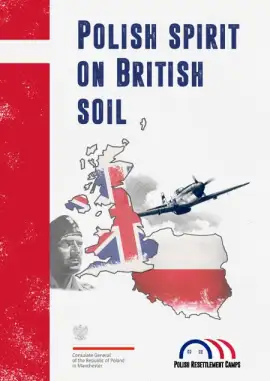Wyspa TV - Where You See People Achieve
SHARE ARTICLE
Select your language
Wyspa TV - Where You See People Achieve
SHARE ARTICLE
We have 451 guests and no members online
 After the end of Second World War Polish Armed Forces in the West scattered across Europe remained under the British command. Due to entirely new political realities which left Poland at the Soviet sphere, myriad of Polish soldiers from Polish Armed Forces in the West were unable to come back home. New political surroundings pressurized them to make the decision which set a new and unknown path.
After the end of Second World War Polish Armed Forces in the West scattered across Europe remained under the British command. Due to entirely new political realities which left Poland at the Soviet sphere, myriad of Polish soldiers from Polish Armed Forces in the West were unable to come back home. New political surroundings pressurized them to make the decision which set a new and unknown path.
Making a large contribution to the war effort, the Polish Armed Forces in the West was composed of army, air and naval forces. The Poles pretty soon became shock troops in Allied service, most notably in the Battle of Monte Cassino during the Italian Campaign, as well as in the Battle of Bologna and the Battle of Ancona (both also in Italy), and Hill 262 in France in 1944. The Polish Armed Forces in the West were disbanded after the war, in 1947, with many former servicemen forced to remain in exile.
In 1946 UK foreign minister Ernst Bevin announced the formation of Polish Resettlement Corps (which operated within the frames of Polish Resettlement Act from 1947. The act provided legal status for Poles). The objective which stood behind this decision was designed to ease Polish soldiers transition from military into civilian life and to keep them under military control until they were fully adjusted to British life. It was mainly run by the British Army. The Polish Resettlement Corps was disbanded after fulfilling its purpose in 1949.
Something about 160,000 people were eligible to join Polish Resettlement Corps. Most of them (110,000) veterans of the Middle East campaigns, many of them were members of the Polish II Corps. Of these, 22,000 were former prisoners of war. Mentioned above figures also included 4,000 members of the Polish Navy, 12,000 members of the Polish Air Force, and 1,000 Polish members of the Women's Auxiliary Air Force (WAAF). The corps had a separate Air Wing for the air force personnel, run by the Royal Air Force. Eventually 115,000 Polish personnel would join the PRC programmers. The corps had its headquarters in Witley and was commanded by Brigadier William Bain Thomas and the Polish major-general Stanislaw Kopanski.
Worth highlighting is that the act was the first immigration legislative framework in the United Kingdom’s legal system. It aimed at resettling the Polish Allied Forces in Britain and provide them with social welfare rights in the country. The act did not only applied to servicemen, but also to their families strictly defining the group of people eligible to settle in The United Kingdom. We set, therefore the exhibition Polish Spirit on British Soil to enable broader audience to find out more about Polish heritage in the United Kingdom ”.
Michał Mazurek Consul General of the Republic of Poland in Manchester
Within the frames of Polish Resettlement Corps were established Polish Resettlement Camps as place where Poles live during transitional period. The period which for many became quite a longer time.
Most of Polish Resettlement Camps where established at previous RAF airfields and logistic centres. In 1949 Polish Resettlement Corps was disbanded and jurisdiction under Polish Resettlement Camps gradually was transferred local British Authorities. In many instances Polish Resettlement Camps gradually were changing and were called Polish Hostels. At very beginning temporal character of PRC had been erased by Poles. They were establishing Polis schools, hospitals, clubs, Polish music bands Polish football teams and cultural centres. In other words cultural life flourished and Polish spirt had been flourishing on British soil. Gradual integration with British society took decades. The last Polish Hostels seized to exists in 1960, but their heritage contributed to the formation of Polish community in The United Kingdom.
Event organized by Consulate General of the Republic of Poland in Manchester